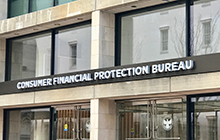|
On January 16, 2025, the CFPB announced that it had entered into a consent order with the operator of a popular peer-to-peer payment application, resolving allegations that the operator had systematically failed to adequately investigate consumer claims of fraud. The operator agreed to pay a minimum of $130 million (and up to $175 million) to resolve the allegations. In its consent order, the CFPB alleged that the operator engaged in unfair and deceptive conduct in violation of the Consumer Financial Protection Act (CFPA) by 1) failing to provide adequate live customer support for the application until 2021, 2) lacking appropriate procedures to address and deter fraud on the application, 3) directing users claiming fraud to submit chargebacks with their bank rather than with the operator conducting investigations required under Regulation E, and 4) making misrepresentations to consumers as to the operator’s issuance of refunds in the event of fraud, the availability of live customer support, and consumers’ rights in the event of fraud. The CFPB further alleged that the operator violated the Electronic Funds Transfer Act (EFTA) and its implementing Regulation E by, among other things, 1) failing to timely conduct investigations into consumer claims of fraud, 2) failing to timely provide consumers claiming fraud with provisional credits while investigations were ongoing, 3) failing to review and reasonably consider relevant evidence and records when making determinations of whether to issue refunds to consumers, and 4) failing to provide consumers with an explanation for its decision not to issue a refund when requested by the consumer. As part of the consent order, the operator agreed to (among other things) maintain live customer service twenty-four hours a day, implement policies designed to identify and combat fraud on the application, provide at least $75 million (and up to $120 million) in consumer redress, and pay a $55 million civil money penalty. |

